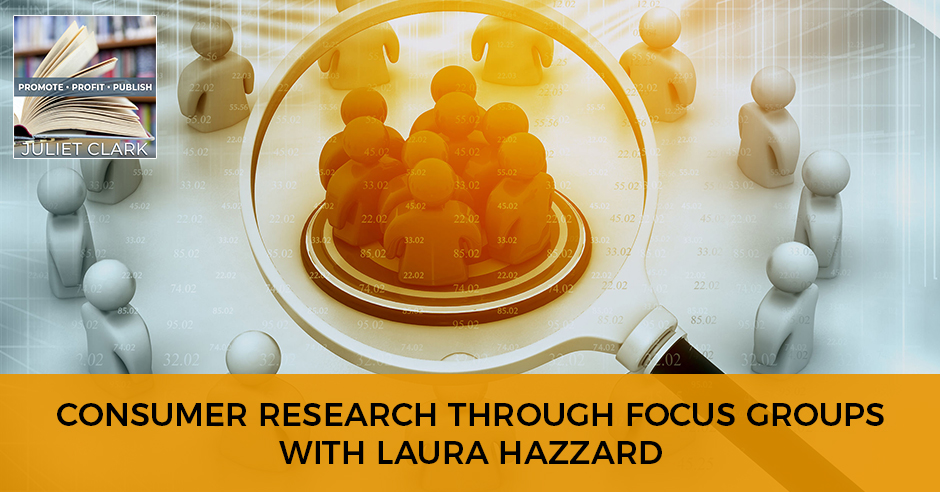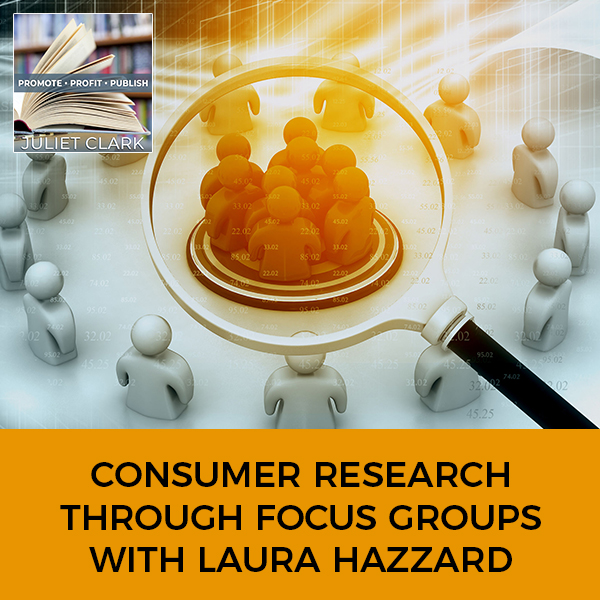
Business is all about attracting your costumers. However, if you do not know how they think, then they will most likely not stick around. Laura Hazzard speaks about knowing your customers and what makes them tick. Laura is a moderator and research consultant who specializes in focus groups and quantitative research. She shares how companies should go out of their way to find out what their customers think through focus groups to know what is wrong with their products or services and what works. For companies today, it has become so important to begin with the usability and the market in mind. Laura breaks down how focus groups and research help with this process, how it is conducted, and why it should be done.
—
Watch the episode here:
Listen to the podcast here:
Consumer Research Through Focus Groups with Laura Hazzard
Before we get started, don’t forget to go over to our Promote, Profit, Publish Quiz, www.PromoteProfitPublishQuiz.com and find out where your skill set is in relation to your platform building and marketing. Our guest is Laura Hazzard. I’m excited to have her because I got to work very closely with her on a project, on an assessment that we’ve put together for an event in Hong Kong for Tracy Hazzard. She is all about, “It’s not about you or me, it’s about the consumer, their needs, their wants, their core values, what drives them and maintains loyalty.” She lives in a world of who, what, where, when, how and most importantly, why. If you don’t understand how your customer thinks, they won’t stick around. Her expertise is in focus groups, small talks, in-depth interviews, in-home use test, usability and quantitative research on online board. Her background research is Target, Starbucks, Disney, Mars, Estée Lauder, Del Monte, Kohl’s and beyond. She is very candid, direct, spirited and a mid-Western at heart.
Thank you for that.
We should also mention that she’s a moderator and a research consultant in Los Angeles that specializes in focus groups. Could you explain a little bit about what a focus group is? I didn’t even know people did them anymore.
A focus group is a qualitative research. That means it’s talking, it’s interviewing, it’s person-to-person. That’s where a group of people, usually four or even ten people, get together and we chat on the topic, a brand. We learn about what consumers love and what they don’t love and it’s focused around an objective. We do a lot of product testing and it’s great because you get to see that person use a product. We also test commercials and different advertising messages. It’s a way to get instant feedback with color. In a quantitative setting, you can have data. I can say, “50% of the people will do this,” but in a focus group, I can hear about why they would buy it or why they wouldn’t buy it.
Back when I was in advertising, we approach people in malls, a mall intercept, and ask them to go into a back room and do this. I would imagine these days you would probably be a creepy pervert or a stalker if you did that. How do you do it these days?
Now, it’s just a panel. Every major city and even a lot of the smaller ones, there’s a panel of people that sign up to do research. They work in all different industries, all ages, all groups of people. They get calls and they say, “Do you fit these criteria? Do you want to come in and do a focus group or other types of qualitative research?” To your point, focus groups is an old and tried and true practice, but there are many newer ways we talk to people beyond just the focus group.

Focus Groups: No one’s going to buy something if they don’t know how it’s going to help them.
The reason this is so important is that it’s tried and true, the company going out and talking to its consumers. That is so important in this market and something that entrepreneurs don’t do. They begin creating without the market in mind and without the usability in mind. Can you speak to that a little bit?
I work with many individuals, small companies, and a lot of them don’t plan in the budget. They don’t even know how much it costs. How can I plan for something if I don’t understand it to begin with? I don’t know the value of it. I don’t have the money for it. Entrepreneurs are inventors and they feel they’re the expert. They are experts, but they don’t know all the consumers and they don’t know all the nuances. Sometimes they overlook consumer research at the beginning because they feel like they don’t need it.
Here’s the thing why it helps so much. When you’re an expert, you’re talking up here. If you don’t know who you’re talking to, are you talking to a beginner level user? Are you talking to a medium? Are you dealing with a higher level person? If you are not speaking the right level and the right language, you may have the right audience but you’re speaking to them completely.
It’s always interesting to hear people describe a brand in their own words or describe a product they use every day in their own words. I bet it’s different than the people who are the engineers and the inventors and the product developers, how they talk about it. No one’s going to buy something if they don’t get it, if they don’t know how it’s going to help them and how it will be valuable in their life. Friends and family can give you some insight into how people will think about your brand or your offering, but you need to get out there. To your point, you’re way up here and you need to know what’s happening down in the weeds, in the stores or with your potential clients.
I highly recommend that you don’t ask your family because your mother loves everything you do.
They won’t be candid. Sometimes people don’t want to do research because they’re scared of what they’re going to hear. I love the negative. Give me the constructive feedback because now we can do something. We can change something and make something better. If it comes back and everything’s great, “I’m going to buy the product,” there’s not much to work with there.
If you don't understand how your customer thinks, they won't stick around. Share on XThere’s a difference too when you’re asking people about these things. They say they’ll buy it, but will they really buy it? In those situations, you find out what it will take for them to buy it and what the price points are that they will buy it as well.
It’s price points. It’s the retailer and the location. They have to be in the right mindset to buy. How many times do you see an ad on Instagram or on TV and you’re like, “That’s cool. I’ll buy that,” but you didn’t? Why is that? It’s because I’m scrolling on my phone. I’m not going to remember to do that later or whatever it is. It’s also the mindset and getting to the consumer at the right place at the right time when they have the means to hire you or buy your products.
There are some ads that I’ve been looking back and forth at the two different companies, which I imagine are competitors. One of them is Wayfair. I look at Wayfair’s commercials and I’m like, “That is hilarious.” I look at their competitors and I go, “I’m not feeling it.”
Maybe someone out there does. I will see an ad and be like, “What research told them to do this?” I hope they did some research for their sake. Sometimes you see something and you’re like, “There’s such a better way to talk to me about this.”
What other things do you do? You and I put an assessment together, but I know that the one we did was very basic for you. You do more in-depth ones. How do you do them? What do you do them for?
I work with entrepreneurs and inventors and they have an idea and a product. We’ll do market assessments. I’ll help them do some research on the market of what’s out there now that helps with retailers and pricing. Sometimes if I’m having a client that’s more established, we’ll do satisfaction tracking. We will send emails out to their lists, check in, see how things are going, what they love and what they don’t. This works for both products and services for my clients that offer a service. It’s also an opportunity to sell them more. When you’re emailing people and asking them how they’re doing and what they want, it’s an easy way to parlay that into serving them better or potentially selling them more. Adding on things to a package or giving them another product that’s similar or that complements. There’s a way to segue into additional sales. I’ll do tracking and satisfaction and the health of the business. It ranges from there, both qualitative and quantitative research depending on what they’re looking for.

Focus Groups: Nobody likes to be sold to. If you can build a relationship, you don’t have to be sales-like.
I want to talk a little bit about the assessment that we did because I was so excited about that to work with Tracy. We did it for an audience in Hong Kong. Talk a little bit about what you guys were doing there.
Tracy was talking to a big audience. Entrepreneurs, business owners, product developers, inventors and not all of them we’re going to be the right fit potentially to be a client of Tracy. It was a great way to survey the crowd, understand where everyone’s at and how she can best serve them. Not only in her talk that day because she wants to speak to them and make it actionable for her audience, but how she can parlay it into a deeper relationship with individuals. We worked through different series of questions that can learn about the audience, learn about their needs, how they feel, how they’re thinking about things so that Tracy could tailor her services to the clientele at the moment.
She had a crowd of 1,500 people, didn’t she? Do you have any stats on it? You had internet problems that day, didn’t you?
I don’t have the exact stats. I’m on the startup end of it all but I do think she had some. It ended up working and she collects data on all these people. She can reach out to them beyond the conference now and she knows more than just an email address. You can get a name and an email from anywhere, but if you know where they’re struggling and what they’re worried about, you can talk to them in a meaningful way that’s memorable and profitable.
I always call it digital listening because when you see those areas they’re struggling, you can create content. It’s almost like, “I was just thinking I didn’t know how to do that and here Tracy has some content for me.”
From what I have seen, when people do even just a hint of research, their eyes widen. It’s a new burst of creativity of ways to understand and talk to their potential customers or someone that’s going to buy their product. If you have a good strategist you’re working with who’s doing the research, they’ll guide you on what to do next. A list or some data points aren’t super actionable, but it can be if you understand the mindset and the psychology behind it all.
Sometimes people don't want to do research because they're scared of what they're going to hear. Share on XThose conversations are what are selling these days. People are tired of the click mentality. They want to talk to people. They want to know they have good support and that somebody listening. That’s the biggest thing. People lost that personal connection.
It’s hard because as consumers, we want instant feedback and instant gratification. I want to just be able to get something. I don’t want to talk to someone. That’s what everyone says on the surface, “I don’t want to talk. Don’t approach me in the store. I don’t need help. Just let me read this thing.” The reality is, people do want help and they want the right help. They don’t want to be annoyed with stuff that isn’t relevant. As people selling products or services, you have to think of it differently and tailor it to make a personalized and individual relationship with each person. People do want to feel connected. People are talking with their dollars. They want to hire people that they like, that they believe and have similar values. They want to buy products that are doing good or aligned with their values. This is a different lens to think about than just, “What’s the lowest price or what’s the fastest I can do this?”
The other thing is, nobody likes to be sold. If you can build a relationship, you don’t have to be salesy. People will know you, like you and trust you enough to have the conversation. What do you think is next without the, “You have to buy this?”
Consumers are savvy. It doesn’t matter where you’re shopping or what you’re buying. People get it. We have so much research at our fingertips now. We, as consumers, know what things cost. We know the right thing, what we want and we can do quick comparisons. People are savvy and they know when they’re being sold to or it’s just an ad or it’s just a gimmick or phony sales stuff. That stuff doesn’t work anymore and it’s a real challenge. To your point with assessments and understanding your consumer, you can speak their language or you can learn to at least.
You can speak their language. The reason there’s such a shift in digital marketing and what works and doesn’t work from year to year is that the consumers are getting savvier. The more technology they have at their fingertips, the more that they can comparison shop. You have things like Yelp, all of these places you can go now to find out what the scoop is on a product. The kiss of death is something like social media where somebody gets on and says, “This thing was broken.”
I went into this store and I was treated badly and now suddenly your Facebook ratings have dropped. Reviews are crazy and we see product reviews now on every website. Amazon owns the review space, but now you’ve got reviews across every website and all very detailed. For now, I watched videos and I looked at photos. I can sort based on someone that looks like me. We are savvy shoppers. When you take that piece out, what matters? Does it work? Is the price good? Does that work for me? Does the company align with me? Are they speaking my language? Do I feel connected when I either use a product or hire someone for a service?
Where can we find you?
AskWhyConsulting.com, that’s my website. You can find me and hire me to do your research studies or whatever you want to learn. Sometimes it’s just getting on a phone call and talking strategy about how to incorporate research. You can find me also with the Product Launch Hazzards. I am on Tracy’s team helping inventors and entrepreneurs get started with their new products.
Thank you so much for being on.
Thank you.
Important Links:
About Laura Hazzard

Laura Hazzard is a moderator and research consultant in Los Angeles, specializing in focus groups, in-depth interviews, in-home use tests, usability, online boards, and quantitative research. Her past clients include Target, Starbucks, Disney, Mars, and Estee Lauder.
Love the show? Subscribe, rate, review, and share!









Leave A Comment